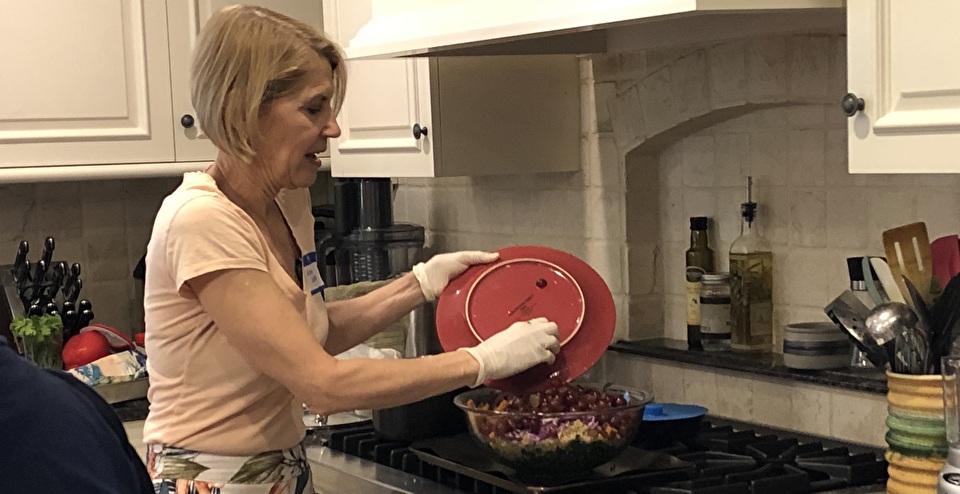
Have you ever wondered just how long-term stress affects our bodies?

Recently, I hosted a "mini-retreat" designed to have the group learn to focus inward and help quiet the mind. We practiced some simple but powerful techniques to manage the stress we all are faced with every day. We were led in some wonderful guided meditations by energy healer, Paula Rosenfeld. And I had the pleasure of introducing and preparing an anti-inflammatory meal for everyone.
I explained how these healing foods help combat the inflammatory response triggered by stress. But I went further to explain how your state of mind while eating can impact the nutritional benefits you receive from your food.
That's right, you might be eating the most nutritional foods, but if your mind is in"fight or flight" mode, that is distracted and stressed, you won't be getting the maximum health benefit from them. Instead, we need to slow down and focus on what we are eating. Another way to say this is, we need to eat mindfully.
Let's take a look at this concept of mindful eating, understand why it matters, and how it can positively impact our overall well-being.
Entering the "Rest and Digest" Mode
To truly absorb the nutritional benefits of our meals, our bodies need to enter a state of "rest and digest." Unfortunately, stress and rushing through meals can hinder this process. When we are stressed or eating quickly, our nervous system remains in that state of "fight or flight" that I mentioned. When we are in this state, the body focuses on diverting blood to the brain and muscles, preparing for problem-solving or escaping potential dangers.
In order to digest our food properly and fully, our bodies need blood to be directed to the digestive tract to aid in nutrient absorption. It takes approximately 20 minutes for our brain to register that we are eating. If we finish our meals hastily, our gut has insufficient time to signal the brain about the intake of food, leaving us feeling hungry and potentially leading to overeating.
The Power of Mindful Eating
To address this issue, we must consciously shift our bodies into the "rest and digest" mode every time we sit down for a meal. This is where mindful eating comes into play. Mindful eating involves bringing a sense of presence and awareness to our meals, allowing us to fully appreciate and savor the experience of nourishing ourselves.
Practical Tips for Mindful Eating
Luckily for us, there are ways we can move from "fight or flight" into "rest and digest" using a few simple techniques! Let's take a look at some practical tricks we can employ to practice mindful eating:
- Set aside time and sit down: When you eat, make it a point to sit down and dedicate time solely to the act of eating. Avoid multitasking or eating while engaged in other activities like watching TV. By sitting down, you signal to your body that you are giving importance to this moment.
- Observe your food: Take a moment to observe the food in front of you. Notice its colors, textures, and ingredients. Pay attention to the presentation on your plate, whether it's neatly arranged or overflowing. This observation helps prepare your brain for the meal ahead.
- Engage your senses: Before taking a bite, take a moment to smell your food. Notice the aroma and identify any specific ingredients. Engaging your sense of smell helps enhance the overall eating experience.
- Eating in silence: When was the last time you ate in silence, without doing something else to distract your attention, like listening to the radio or watching TV? For ten minutes, try to eat your meal in silence. This allows you to eat slowly and mindfully. You'll be amazed at the things you'll start to notice and how long 10 minutes really is! But this time will allow you to focus on eating.
While you are eating mindfully, you might want to focus on the following:
- Chew each bite thoroughly: Chew your food thoroughly before swallowing. Aim to swallow each mouthful before taking the next bite. You can try placing your fork down between bites or even use your non-dominant hand to slow down the pace of your eating.
- Experiment with chewing times: Challenge yourself by chewing each bite 30 times before swallowing. Notice how the flavors change over time and any emotions that arise during this process. If 30 chews seem excessive, try 20 or 15. The key is to bring your attention to the act of chewing. As you are eating observe what emotions might come up. Did you find this calming, frustrating, or boring? All these are natural reactions. Did you notice changes in the flavor or texture of your food the longer you chewed?
I hope you try some of these mindful eating tips. Incorporating these practices into our lives helps us change our relationship with food. By being present and intentional in our eating, we can truly nourish our bodies and help calm the stressful chatter that goes on in our heads daily.
And don't get frustrated when trying mindful eating. Remember, better health is a journey, and it takes practice to fully embrace this approach. Start by incorporating small changes into your meals, such as dedicating time to eat without distractions, observing your food before diving in, and chewing slowly. Over time, these routines will become habits that you will follow naturally. In the process, you'll reap the benefits of improved digestion, better portion control, and heightened enjoyment of your meals.
Have you tried any of these techniques before? Do you have any other ideas you'd like to share? Let me know and I can pass your ideas along to the rest of the group!
Yours in Health,
Evey

